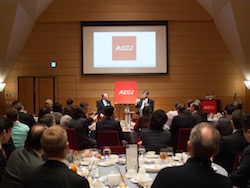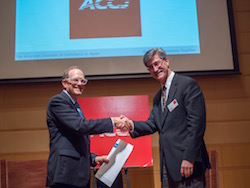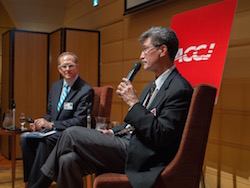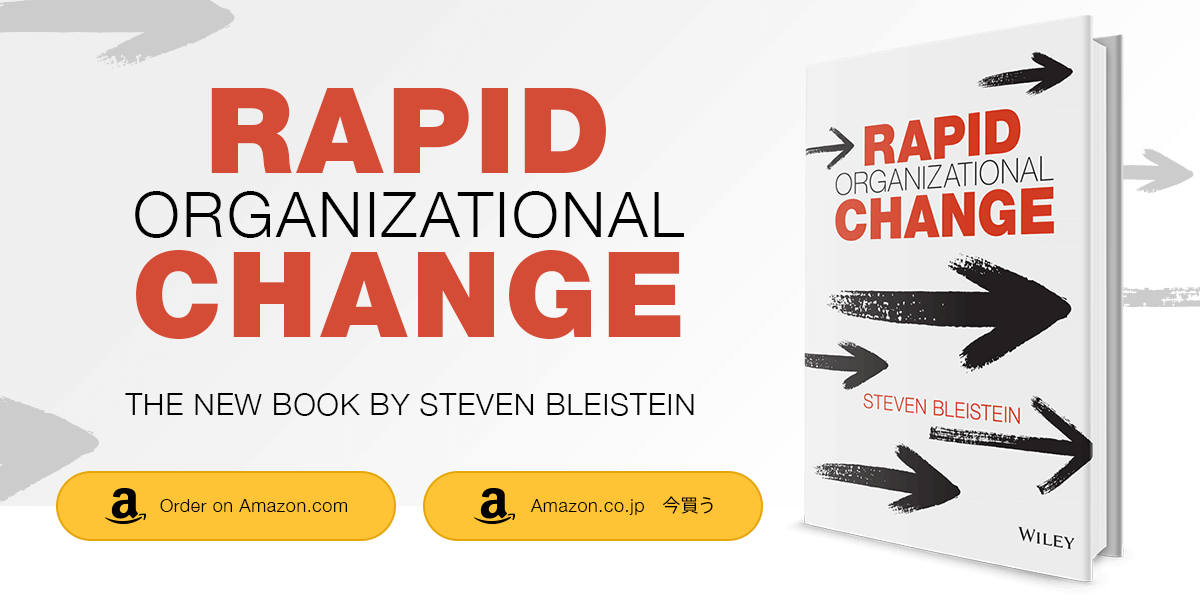[:en]
My February 3rd Conversation With Steve Dacus event, jointly hosted by the American Chamber of Commerce in Japan and the Australia New Zealand Chamber of Commerce in Japan was fully booked with over seventy people in attendance. As with all my “Conversation With…”I leave ample time for the audience to ask questions of the guest directly, and like always, this audience participated with zeal.
Here some key takeaways from my conversation with Steve Dacus:
The Japanese are no different from other people in the world. Click To Tweet- It is human to want to be acknowledged and respected for doing a good job. People respond well when you can enable that, and that enables a company to change. Traditional hierarchical culture limits that—ideas from below are stifled and people become conditioned to do only as they are told rather than think independently an act accordingly. Change that culture and you can change the organization.
- Don’t only rely on market data to guide your decisions. If you have Japanese relatives, think what they might do. In my case, I may ask what my wife’s Aunt Masako would want.
- Don’t be afraid to remove people from the organization who won’t change. Start with the leaders. No change is possible if your senior to mid-level leaders on not on board.
- Evangelize constantly with your people directly. Talk about what your business is about and what you strive for.
- Behave how you want your leaders to behave.
- In Japanese organizations, get rid of the practice of addressing subordinates with the diminutive -kun. It is neither endearing nor respectful. It lessens people’s individual importance. How can you ask an employee to come up with good ideas and take initiative, when you address him or her in the same form that is reserved for children? Everyone should be addressed with the polite -san.
I have conducted previous “Conversation With…” events with other guests, including Rod Lappin, CEO of Lenovo Japan and James Chen, COO of Rakuten Ichiba. Don’t miss the upcoming “Conversation with Fulvio Guarneri, CEO of Unilever Japan” luncheon on June 3. Details will be posted on the ACCJ Web Site (www.accj.or.jp).


Photos courtesy of the American Chamber of Commerce in Japan (ACCJ)
 私主催、在日米国商工会議所と在日オーストラリア・ニュージーランド商工会議所の協賛で2月3日に行われたスティーブ・デイカス氏のインタビューは、70人以上が参加するという超満員のイベントとなりました。通常の”Conversation With…”イベントと同じく、直接ゲストに質問できる時間も十分に取り、やはりいつものように出席者は熱心に参加してくれました。
私主催、在日米国商工会議所と在日オーストラリア・ニュージーランド商工会議所の協賛で2月3日に行われたスティーブ・デイカス氏のインタビューは、70人以上が参加するという超満員のイベントとなりました。通常の”Conversation With…”イベントと同じく、直接ゲストに質問できる時間も十分に取り、やはりいつものように出席者は熱心に参加してくれました。
ここにスティーブ・デイカス氏との会話から学んだことをいくつか挙げてみます。
- 日本人は他国の国民と何の変わりもありません。良い仕事をこなせば、それを認めてもらい尊敬してもらいたいと思うのは、誰でも一緒です。そういう環境を作れば、人々は良い方向に向かうし、その結果、会社が変わっていくことも可能になるのです。古風な階級組織の文化があるところは、それがなかなかできません。下層からのアイディアは抑圧され、独自の考えを持ったりそれに従った行動をとるより、言われたことだけをこなすように訓練されてしまっているからです。そういった会社文化を変えれば、会社の改革ができる筈です。
- 何か決断が必要な際、市場データにのみ頼るのは止めましょう。もし日本人の親戚がいれば、その人だったらどうするか想像してみてごらんなさい。例えば私の場合は、「マサコ叔母さんだったらどうしたいだろう。」と考えたりするわけです。
- 変化しようとしない社員に辞めてもらうことを恐れる必要はありません。そういう人たちがいれば、まずリーダークラスから始めて下さい。会社の改革に乗り気でない中間〜上級管理職がいれば、改革などまず無理なのですから。
- 自分たちのビジネスとはどういうものか、そして何に向かって頑張っているのか、常に社員に直接語りかけましょう。
- 自分がリーダーに求めるような行動を、自分でもとるように心がけてください。
- 日本の会社では、部下を君付けで呼ぶ習慣がありますが、これはやめましょう。可愛く聞こえるわけでもない上に、尊敬の気持ちも込められているようでもありません。個人個人の重要さを軽視している感があります。子供を指しているかのような呼び方をされている社員に、良いアイディアを出したり率先して行動することを頼めますか。誰でも丁寧な「さん」付けで呼んであげるべきです。
過去の”Conversation With…”イベントではレノボ・ジャパンの最高責任者ロッド・ラピン氏や楽天市場の執行役員、ジェームズ・チェン氏などをお招きしました。次の”Conversation With…”は、6月3日にユニリーバ・ジャパンの最高責任者、フルヴィオ・グアルネリ氏を迎え開催される予定ですので、このチャンスをお見逃しなく。詳細は在日米国商工会議所ウェブサイトに掲載されます。


写真提供:在日米国商工会議所
[:]


